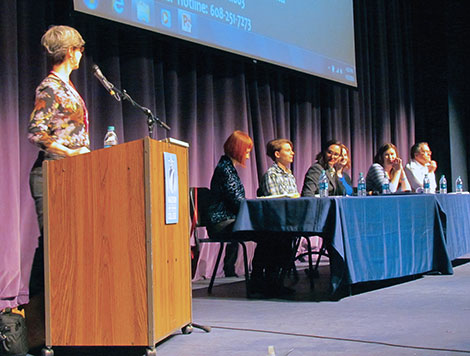Panel discusses rape, ‘The Hunting Ground’

A panel discussion followed a screening of the documentary, “The Hunting Grounds,” in Mitby Theater on April 22.
May 11, 2015
In honor of national sexual assault awareness month, Madison College hosted a free showing of “The Hunting Ground” followed by a panel discussion in the Mitby Theatre on April 22. This is just one of the many recent events the school has held in order to promote sexual safety and give students a chance to bring their questions and concerns to experts.
“The Hunting Ground” is a brutal and often times disheartening documentary about the epidemic of college sexual assault and rapes in the United States that originally premiered at the Sundance Film Festival this year. Kirby Dick directed the film. He is the justice-seeking soul behind the documentaries “The Invisible War” and “Outrage.”
“The Hunting Ground” follows the college careers of Andrea Pino, 23, and Annie E. Clark, 25, from the University of North Carolina at Chapel Hill, but the focus is not on their academic life, but the ostracism and neglect they were faced with when the place they had so long dreamt of attending and paid so much money to belong to, failed them completely when they needed it the most: after being victims of sexual assault.
Once Pino and Clark became aware of each other and started speaking out, they realized they were not alone and dedicated the rest of their college careers, and the rest of their lives, to creating a network of strength, resources and sanctuary for all of the young collegiate women across the country whom are being so utterly failed by their universities and local police departments after being victims of rape, attempted rape and sexual assault.
Though horrible statistics were sprinkled throughout the film in order to show the scope and range of this issue, the success of this documentary lay in its emphasis on individual young women and the screen time devoted to their testimonials, their stories, their battles, and their tears.
The panel afterward consisted of Natalie Connors, Editor-in-Chief of the Clarion, Kate Golden, Multimedia Director and Reporter for WisconsinWatch.org, Jaime Sathasivam with the Dane County Rape Crisis Center, Aly Jarocki, a Prevention and Education Advocate for DAIS, Anne McClintock a Professor of English, Gender, and Sexuality Studies at UW-Madison, and Brad McDowell, professor of Psychology at Madison College.
Though there was no shortage of questions from the eager and righteously outraged audience members, one of the questions that provoked the most thoughtful responses from the panel was a simple and unsettling one: “Why does this happen?” While the film touched upon the consequences – or lack thereof – and the university systems’ less than inadequate handling of these cases, it never did touch on the root of the cause, for that was not its focus.
McDowell touched on some points from the Psychology of Men class he teaches, saying that he believed that the humanity is driven out of men from the time they are born and that we as a society continue to actively create a social system of policing men on staying inside of a box where emotion and expression are not allowed. This creates what he referred to as a “gender role strain” and that we should all strive to encourage its bending and breaking on a daily basis.
Connors and a few other panel members brought up the word “entitlement” and echoed a strong sentiment in the film: rapists aren’t scary strangers, but the people you see every day, and often the people you are closest to. Most men aren’t rapists, but the ones that are repeat offenders use rape as an outlet for violence.
Connors emphasized that agreeing to date someone doesn’t give them access to your body. With all forms of sexual contact, there needs to be a constant, ongoing stream of mutual communication. Anything done without consent, whether it is unwanted touching from a coworker, or a catcall on the street, is sexual harassment.
This event helped get the conversation started at Madison College, one those in attendance want to see continue. McClintock remarked that social media has become an invaluable tool in helping spread the message, and that every day she is “hearing the silence break.”
Support at Madison College is available through the public safety office and the Counseling Office. The Dane County Rape Crisis Hotline is open 24/7 and can be reached at 608-251-7273.































